The role of engineers in accelerating implementation of Disaster Risk Reduction and Resilience
9 October 2023
This webinar will explore the significance of the recommendations from the Sendai Framework Mid-term Review for engineers, led by the International Coalition for Sustainable Infrastructure (ICSI).
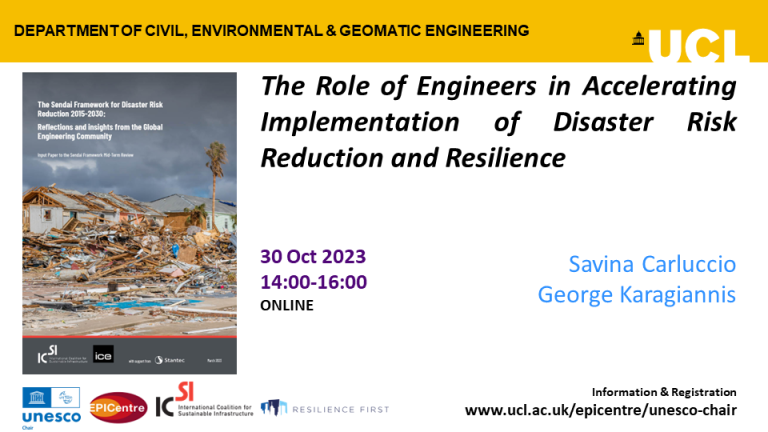
The UNDRR’s Sendai Framework for Disaster Risk Reduction went through a formal mid-term review to take stock of implementation and impact since its launch in 2015, understand what context shifts have occurred and identify how to accelerate uptake to 2030 and beyond. The International Coalition for Sustainable Infrastructure (ICSI), with support from the Institution of Civil Engineers (ICE) and contribution by the World Federation of Engineering Organizations Committee for Disaster Risk Management, led a multi-lingual consultation to elicit the views of 250+ engineering practitioners and experts from over 50 countries. Findings of the consultation were published in a report that was the first ever and only contribution from the engineering community to the formal mid-term review process of the Sendai Framework. Implementation of disaster risk reduction and resilience is a multi-stakeholder effort and engineers have a key role. The webinar will explore the significance of the recommendations from the Sendai Framework Mid-term Review for engineers. This session will convene key stakeholders from the engineering community to share examples of how they are contributing to the global agenda for DRR and resilience and to discuss how its implementation can be accelerated. |
Presenters’ biography
Savina Carluccio
International Coalition for Sustainable Infrastructure (ICSI)
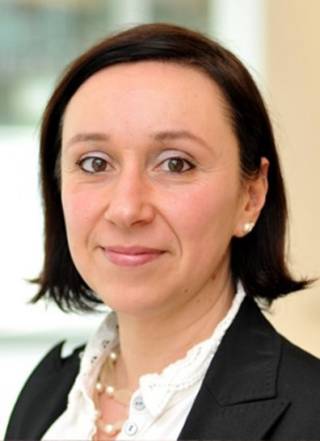
Savina is the Executive Director of the International Coalition for Sustainable Infrastructure (ICSI) and a fervent advocate of the role of civil engineers in tackling our society’s biggest challenges. She is an experienced Civil Engineer and infrastructure practitioner with twenty years’ experience advising government, infrastructure owners and operators, multi-lateral development banks and NGOs to develop and implement just, inclusive, sustainable and resilient infrastructure that is fit for people and the planet.
Prior to taking her role at ICSI, she worked as an Associate Director and infrastructure advisor at Arup, and she was the Head of Guidance and Standards at the Resilience Shift. She also serves a member of Institution of Civil Engineers’ Advisory Board on sustainable and resilient infrastructure.
George Karagiannis
Resilience First
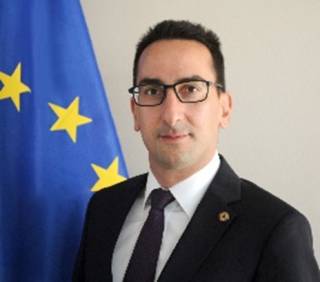
George Karagiannis is the Engineering Leadership Group Director at Resilience First. From 2019 to 2022, he was Greece's Deputy Secretary-General for Civil Protection. Before that, he was Technical Officer at the European Commission Joint Research Center, working on emergency management and critical infrastructure protection. Prior to joining the Joint Research Center, he was a Disaster Management Consultant and has worked in five countries. He also was a Research Scientist at the Technical University of Crete in Greece, where his interdisciplinary research lay at the intersection of systems engineering and disaster resilience. George earned his Doctorate in Environmental Science and Engineering from Saint-Etienne School of Mines in France.
Daniel Stevens
National Grid Plc
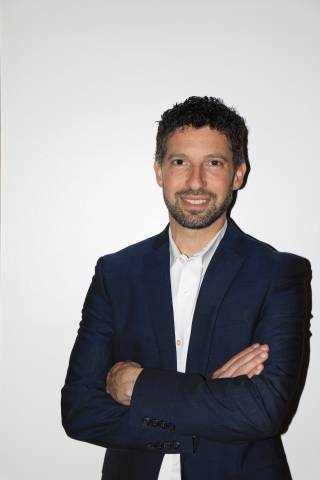
Daniel Stevens is the Vice President, Group Head of Resilience and Crisis Management for National Grid Plc. In this capacity he is leading and implementing the strategic vision to re-think how National Grid moves through the energy transition, addresses the challenges of climate adaption, and enables greater resilience to the threats and hazards facing our industry. Daniel works across all parts of the company and advocates externally to promote industry changes and share innovative solutions.
Prior to joining National Grid, Daniel held various leadership roles in the public and private sector. Daniel was most recently the Global Lead for Resilience and Emergency Management in Accenture’s Utilities practice. Prior to that he helped establish the Business Resilience Department at Southern California Edison and worked for over 10 years at the US Department of Homeland Security’s, Federal Emergency Management Agency (FEMA).
Daniel works out of National Grid’s Brooklyn, NY office, he is the father of three boys, and his wife Amanda also works in the utility industry. He is driven by his passion for a safe, clean, and equitable energy future, not just for the customers and communities we serve, but for future generations to come.
Prof. Kapil Gupta
IIT Bombay, Mumbai, India
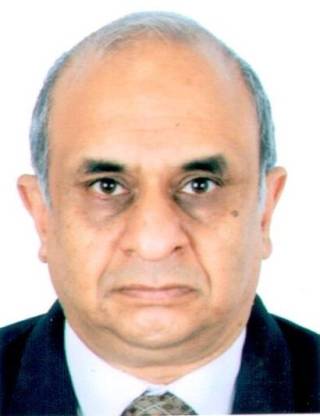
Prof. Kapil Gupta is presently Leverhulme Visiting Professor at CEGE, UCL and Professor of Civil Engineering at IIT Bombay, Mumbai, India. He obtained his B.Tech. from IIT Delhi, M. Tech from IIT Madras and doctorate from the University of Sheffield, U.K. He has carried out flood disaster mitigation projects for the Mumbai Airport and the Mumbai Railways. He has been on the advisory committees of major cities like Mumbai, Chennai, Hyderabad, Guwahati, etc. He has been associated with the CDRI since its inception (Coalition for Disaster Resilient Infrastructure - 32 + countries including UK are members). In partnership with UCL, he has been carrying out a CDRI-British Council project on developing course material for disaster resilience engineering education. This is now in its third phase with partnership with Indian Industry as well.
Bram Evers
Royal HaskoningDHV
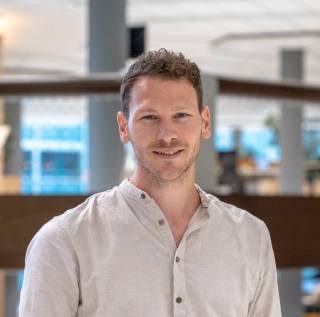
Bram is a consultant in climate resilience working in the climate resilience group of Royal HaskoningDHV. For the past 8 years he has been working on many different projects in the of field climate adaptation and risk reduction. He has a passion for understanding the complex interactions between natural systems and their surrounding environments, and finding sustainable and effective solutions that suit the local context. He has worked with various clients (public and private) and stakeholders in different parts of the world.
Anna Morley
Arup

Anna is the vice-chair of the Engineering Group of the Geological Society. She currently specialises in diagnosing, quantifying and mitigating natural hazards and risk from city scale, down to bespoke engineering designs for site-scale particularly in low and middle income countries. She is an Associate Director at Arup in London where she has been based since an Engineering Geology MSc at Imperial College (2002) and via a short stint at Arup in Hong Kong. Anna has varied international experience (Africa, UK, Middle East, East Asia, Central Asia) leading diverse teams to deliver projects that mitigate and adapt to natural hazards (e.g. landslides, flooding). The team she leads specialise in delivering quantitative hazard and risk measures at country, regional or city scale that allows objective decision making and prioritization of funds by policy makers and other stakeholders. At site scale, Anna leads teams that scope, design and deliver mixed grey and green infrastructure interventions in emerging economies.
Sólveig Thorvaldsdóttir
University of Iceland
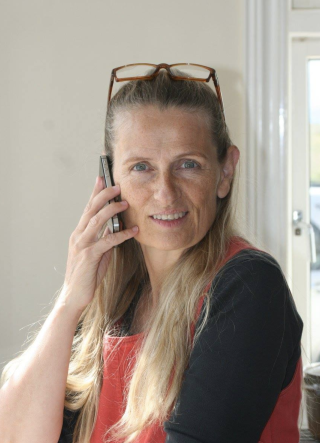
Sólveig Thorvaldsdóttir has degrees in civil and earthquake engineering, and a PhD in Disaster-related Management System Design, focusing on a systems approach. Some of her contributions to disaster risk reduction are in earthquake loss modelling, disaster-related management system research and design, and Urban Search and Rescue training and response. She is the former director of the Icelandic Disaster Management Agency, where she led significant changes to the Icelandic disaster-response system, and later established Rainrace Consultancy. Current engagements include working for the University of Iceland teaching about disaters and participating in research projects, fire service on developing procedures, and the United Nations and International Search and Rescue Advisory Group on developing procedures for international urban search and rescue.
 Close
Close

